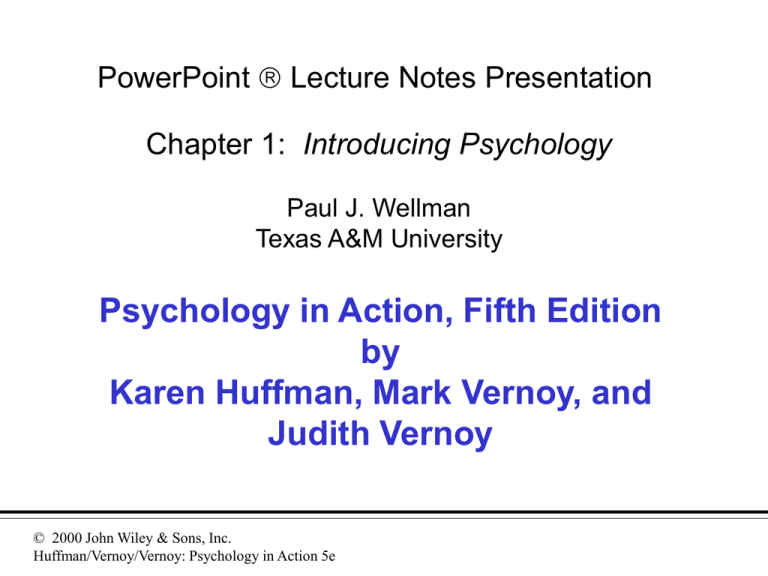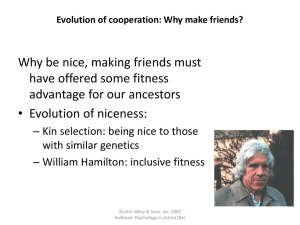
PowerPoint Lecture Notes Presentation
Chapter 1: Introducing Psychology
Paul J. Wellman
Texas A&M University
Psychology in Action, Fifth Edition
by
Karen Huffman, Mark Vernoy, and
Judith Vernoy
© 2000 John Wiley & Sons, Inc.
Huffman/Vernoy/Vernoy: Psychology in Action 5e
Lecture Overview
•
•
•
•
Understanding Psychology
Psychological Research
Ethics in Psychology
Schools of Psychology
© 2000 John Wiley & Sons, Inc.
Huffman/Vernoy/Vernoy: Psychology in Action 5e
The Study of Psychology
• Psychology is defined as the scientific
study of behavior.
– Overt behaviors can be observed
– Covert behaviors are not directly observable
• Goals of psychology
– Describe behavior
– Explain behavior
– Predict behavior
– Change behavior (in helpful ways)
© 2000 John Wiley & Sons, Inc.
Huffman/Vernoy/Vernoy: Psychology in Action 5e
Psychological Research
• Two forms of psychological research:
– Basic research seeks answers for
theoretical questions
• E.g. How is hunger controlled by the brain?
– Applied research seeks answers for
specific application problems
• E.g. Organizational psychology studies
leadership, job satisfaction, training and
development
– Can leadership be trained?
© 2000 John Wiley & Sons, Inc.
Huffman/Vernoy/Vernoy: Psychology in Action 5e
Areas of Psychology
•
•
•
•
Clinical
Educational
School
Industrial/organizational
• Developmental
© 2000 John Wiley & Sons, Inc.
Huffman/Vernoy/Vernoy: Psychology in Action 5e
•
•
•
•
Social
Comparative
Neuropsychology
Health
psychology
• Cognitive
Psychology Careers
© 2000 John Wiley & Sons, Inc.
Huffman/Vernoy/Vernoy: Psychology in Action 5e
Correlation
• The correlation technique indicates the
degree of association between 2
variables
• Correlations vary in direction:
• Positive association: increases in the value of
variable 1 are associated with increases in the
value of variable 2
• Negative association: increases in the value of
variable 1 are associated with decreases in the
value of variable 2
© 2000 John Wiley & Sons, Inc.
Huffman/Vernoy/Vernoy: Psychology in Action 5e
Pseudopsychologies
• Astrology: relationship of personality to
the stars
• Palmistry: reading a person’s character
from the lines on their palms
• Psychokinesis: moving objects via will
• Follicology: relation between hair color
and personality
© 2000 John Wiley & Sons, Inc.
Huffman/Vernoy/Vernoy: Psychology in Action 5e
© 2000 John Wiley & Sons, Inc.
Huffman/Vernoy/Vernoy: Psychology in Action 5e
The Experiment
• An experiment involves a set of
controlled conditions that aims to
confirm a hypothesis
• Hypothesis refers to a statement of
cause and effect:
• Higher environmental temperatures lead to
more aggression
• Exposure to marijuana increases appetite
© 2000 John Wiley & Sons, Inc.
Huffman/Vernoy/Vernoy: Psychology in Action 5e
Experimental Variables
• To test a hypothesis, an experimenter
defines the variables of the hypothesis:
– Cause: Independent variable (IV)
• Marijuana: Plain cigarette vs marijuana cigarette
– Effect: Dependent variable (DV)
• Appetite: Grams of ice cream consumed in 1
hour
• The experimenter manipulates the IV and
measures the DV
© 2000 John Wiley & Sons, Inc.
Huffman/Vernoy/Vernoy: Psychology in Action 5e
Research Issues
• Controls are important for determining
causality.
– The only difference between the
experimental and control groups should be
the IV.
• Placebo effects
– Use a control group
• Experimenter bias
– Use double blind procedures
© 2000 John Wiley & Sons, Inc.
Huffman/Vernoy/Vernoy: Psychology in Action 5e
Nonexperimental Research
• Naturalistic observation refers to the
systematic recording of behavior in a
natural state or habitat
– E.g. Jane Goodal observing apes in the
wild
• Surveys are instruments designed to
sample attitudes or behaviors
• A case study is an in-depth study of a
single person
© 2000 John Wiley & Sons, Inc.
Huffman/Vernoy/Vernoy: Psychology in Action 5e
Correlations
• Correlations also vary in the strength of
the association
– Zero correlation: no relationship between
the 2 variables
– Strong correlation: knowing the value of
one variable permits one to estimate the
value of the other variable
• Correlations can be seen in scatter plots
© 2000 John Wiley & Sons, Inc.
Huffman/Vernoy/Vernoy: Psychology in Action 5e
Ethical Issues in Research
• The Milgram Study
• Informed consent involves an
explanation of a study and the
responsibilities of experimenter and
participant
– Deception must be justified
• Debriefing refers to explaining the
research process to the subjects at the
end of the study
© 2000 John Wiley & Sons, Inc.
Huffman/Vernoy/Vernoy: Psychology in Action 5e
Early Schools of Psychology
• Structuralism focused on sensations and
perceptual experiences
• Functionalism investigated functions of
mental processes in adapting to the
environment
• Gestalt psychology emphasized
perception; the notion that the whole is
more than the sum of the parts
© 2000 John Wiley & Sons, Inc.
Huffman/Vernoy/Vernoy: Psychology in Action 5e
Modern Psychology Views
Psychoanalytic view emphasizes the
unconscious mind
Behaviorism focuses on objective and
measurable behaviors
Humanistic psychology emphasizes the
innerself and subjective feelings
Cognitive psychology focuses on mental
function and reasoning
© 2000 John Wiley & Sons, Inc.
Huffman/Vernoy/Vernoy: Psychology in Action 5e
Modern Psychology Views
Psychobiology views behavior as
reflecting brain processes
Evolutionary psychology asserts that
certain behavioral characteristics are
subject to natural selection
Cultural psychology examines the
influence of culture and ethnic practice on
people’s behavior
© 2000 John Wiley & Sons, Inc.
Huffman/Vernoy/Vernoy: Psychology in Action 5e
Copyright
Copyright 2000 by John Wiley and Sons, New York,
NY. All rights reserved. No part of the material
protected by this copyright may be reproduced or
utilized in any form or by any means, electronic or
mechanical, including photocopying, recording, or by
any information storage and retrieval system, without
written permission of the copyright owner.
© 2000 John Wiley & Sons, Inc.
Huffman/Vernoy/Vernoy: Psychology in Action 5e









